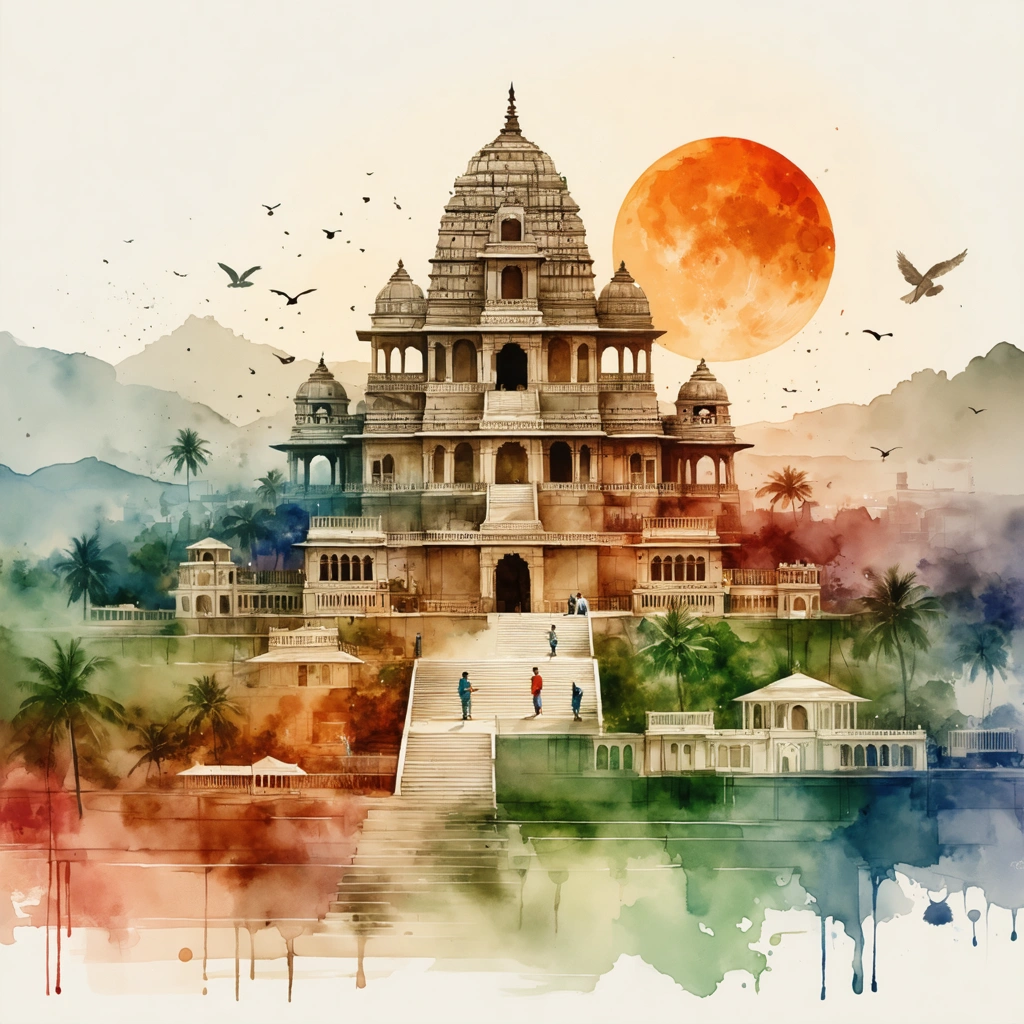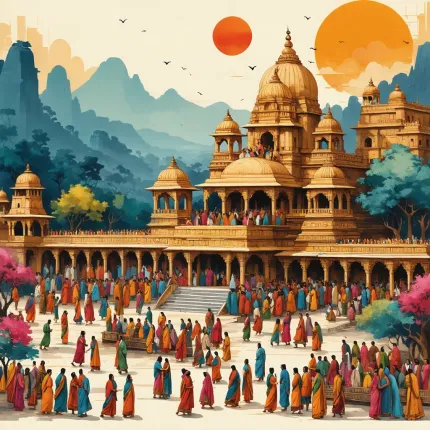Spiritual Music of India: Immerse in the spiritual music traditions of India in 2025.

Unearthing the Soulful Echoes of India’s Spiritual Heritage
Have you ever felt a melody so profound that it seemed to pierce through the noise of everyday life, touching a deeper part of your being? In a world buzzing with distractions and digital noise, many are seeking solace in sounds that transcend the ordinary—sounds that invite us to pause, reflect, and reconnect with something greater. The spiritual music traditions of India, rich and timeless, offer exactly that experience. But why is it that despite its vast richness, this treasure trove often remains underexplored or misunderstood by many? And in 2025, as global cultures blend and evolve, how can we truly immerse ourselves in these sacred soundscapes?
Let’s face it: spiritual music is more than just pleasant background tunes. It’s a living, breathing expression of faith, devotion, and philosophy, wrapped in melodies that have traveled centuries. Yet, the sheer diversity—from the fervent Bhakti Sangeet to the mystical Sufi Music India traditions, and the soul-stirring Devotional Songs Hindi—can feel overwhelming. Many listeners, especially those new to Indian spirituality or music, struggle to grasp the depth and context behind these art forms. This lack of understanding can create a barrier, making spiritual music feel distant or overly complex rather than inviting and nurturing.
Why Do We Need Spiritual Music Now More Than Ever?
In 2025, the fast-paced rhythm of modern life often leaves people feeling fragmented and disconnected. Emotional stress, cultural dissonance, and an increasing sense of isolation have driven many to seek healing through non-conventional means. Here, spiritual music shines—not merely as entertainment but as a therapeutic vessel that nurtures the soul.
Consider Bhakti Sangeet, for example, a genre rooted deeply in devotional worship. It’s not just music; it’s a heartfelt dialogue between the devotee and the divine, often expressed through simple yet powerful lyrics and melodies. This tradition has been a source of comfort for millions, transcending age, class, and language. Yet, outside certain cultural circles, its significance is often reduced to mere folklore or exotic sound bites.
Similarly, Sufi Music India carries an enchanting mysticism. Emerging from centuries-old Sufi traditions, it’s a poetic and melodic journey into spiritual ecstasy and union with the divine. The hypnotic rhythms and soulful vocals have a mesmerizing effect, capable of dissolving the ego and fostering inner peace. But many outside India—and even within—may only recognize it superficially, missing the profound stories and spiritual philosophies woven into its fabric.
And then there are Devotional Songs Hindi, a vibrant and accessible gateway for millions who speak or understand Hindi, offering lyrical narratives that celebrate gods, saints, and spiritual ideals. These songs often merge classical forms with contemporary sounds, making them relatable yet deeply spiritual. Despite their popularity, the deeper meanings and historical contexts sometimes go unnoticed in today’s fast music consumption culture.
So, how do we bridge this gap?
The answer lies in intentional immersion. In 2025, with technology’s reach expanding, it’s easier than ever to access authentic spiritual music from India. But listening alone doesn’t suffice. To truly appreciate and absorb the essence of Bhakti Sangeet, Sufi Music India, or Devotional Songs Hindi, one must engage with their stories, cultural contexts, and spiritual philosophies. These traditions are living arts—they invite participation, understanding, and a heartfelt connection.
Imagine sitting in a serene space, earbuds in, as the gentle strains of a Bhakti Sangeet kirtan wash over you, the repetitive mantras inviting your mind to slow and your heart to open. Or attending a live Sufi music gathering, where the energy of collective devotion creates an almost tangible spiritual upliftment. Picture humming along to a Devotional Song in Hindi, feeling the vibrations of ancient verses resonate with your own quest for meaning.
These are not just musical experiences—they are transformative journeys. In this article, we will delve into the unique characteristics of each tradition, explore their historical and cultural roots, and offer practical ways to incorporate these sacred sounds into your life in 2025. Whether you’re a seasoned listener or someone curious about India’s spiritual heritage, there’s a world of depth waiting to be discovered.
What to Expect in This Exploration
Here’s a roadmap of what we’ll cover:
- Bhakti Sangeet: Understanding its origins in devotional movements, key artists and styles, and how it continues to inspire spiritual seekers today.
- Sufi Music India: Tracing its mystical roots, signature musical elements, and its role in bridging cultural and religious divides.
- Devotional Songs Hindi: Examining the lyrical richness, popular forms, and how modern adaptations keep this tradition alive and relevant.
- Practical Tips: How to experience and integrate these spiritual music traditions in your daily routine, from curated playlists to attending live events and online communities.
So, if you’ve ever yearned to find a soundtrack for your spiritual journey, or simply want to appreciate the profound musical heritage of India, you’re in for an illuminating ride. Let’s embark together, tuning in to the ancient echoes that still pulse vibrantly through the heart of India’s spiritual music scene in 2025.

Spiritual Music of India: Immerse in the Spiritual Music Traditions of India in 2025
What is the significance of spiritual music in India’s cultural and religious landscape?
Spiritual music in India holds a profound place, deeply intertwined with centuries-old religious practices, philosophy, and cultural identity. It serves as a medium to connect the devotee with the divine, facilitating meditation, devotion, and spiritual awakening. India’s spiritual music encompasses various traditions, including Bhakti Sangeet, Sufi Music India, and Devotional Songs Hindi, each reflecting unique regional and religious nuances.
In 2025, the resurgence of interest in these traditions is driven by a growing global appreciation of mindfulness and spirituality, coupled with digital platforms that make these ancient art forms more accessible. The spiritual music of India is not just entertainment; it is a living tradition that nurtures the soul and preserves India’s diverse cultural heritage.
What are the main types of spiritual music traditions in India?
India’s spiritual music is richly diverse, but three main traditions stand out prominently:
- Bhakti Sangeet: Rooted in the Bhakti movement, this genre emphasizes devotional singing dedicated to deities like Krishna, Rama, Shiva, and Durga. Bhakti Sangeet includes forms such as bhajans, kirtans, and abhangas, characterized by simple melodies and repetitive chants designed to evoke deep devotion and communal participation.
- Sufi Music India: This genre represents the mystical branch of Islam with its emphasis on divine love and spiritual union. Sufi Music India includes qawwalis, kafi, and other forms that use poetry and music to transcend the physical and reach spiritual ecstasy. The legacy of Sufi saints like Amir Khusro and contemporary performers like Abida Parveen bring this tradition to life.
- Devotional Songs Hindi: These songs are a subset of spiritual music widely popular across Hindi-speaking regions. They often blend classical and folk elements and can be found in temples, festivals, and even Bollywood soundtracks. Devotional Songs Hindi serve to communicate religious stories, moral values, and spiritual teachings in an accessible language and format.
How has digital technology influenced the accessibility and popularity of India’s spiritual music in 2025?
Digital technology has revolutionized how spiritual music traditions like Bhakti Sangeet, Sufi Music India, and Devotional Songs Hindi reach audiences worldwide. Streaming platforms such as Spotify, YouTube, and dedicated spiritual music apps have made these genres far more accessible than ever before.
Additionally, virtual concerts and online music festivals have emerged, especially post-pandemic, allowing artists to connect with global audiences in real time. This has led to increased cross-cultural exchanges and fusion projects that blend Indian spiritual music with global genres, further expanding its appeal.
Data from industry reports in 2024 indicates that spiritual music streams have grown by over 35% year-on-year globally, with Indian spiritual genres witnessing a significant share. This trend reflects a global awakening to the calming and transformative power of these musical traditions.
What are some notable artists and examples in the spiritual music traditions of India?
Several legendary and contemporary artists have shaped and continue to enrich India’s spiritual music landscape:
- Bhakti Sangeet: Artists like Anup Jalota and Jagjit Singh have popularized bhajans globally, creating timeless renditions that continue to inspire.
- Sufi Music India: Abida Parveen, Nusrat Fateh Ali Khan, and Rahat Fateh Ali Khan are iconic names whose qawwalis and Sufi performances are celebrated worldwide.
- Devotional Songs Hindi: Singers such as Lata Mangeshkar and Shreya Ghoshal have lent their voices to many devotional songs that resonate deeply with audiences across generations.
Beyond individual artists, institutions like the Sangeet Natak Akademi and various cultural festivals play a pivotal role in preserving and promoting these traditions.
Why should one immerse in India’s spiritual music traditions in 2025?
Immersing oneself in India’s spiritual music traditions offers multiple benefits:
- Emotional and mental well-being: The meditative qualities of Bhakti Sangeet and the transcendental nature of Sufi Music India can reduce stress, enhance concentration, and foster inner peace.
- Cultural appreciation: Engaging with these traditions deepens understanding of India’s vast religious and cultural diversity.
- Community and connection: Participating in devotional singing or attending spiritual music gatherings builds social bonds and shared spiritual experiences.
- Spiritual growth: The repetitive chants and soulful melodies serve as tools for devotion, contemplation, and spiritual awakening.
In 2025, with increasing interest in holistic lifestyles, spiritual music from India offers a timeless resource for seekers worldwide.
How can beginners start exploring India’s spiritual music traditions?
For those new to these genres, here are practical steps to begin your journey:
- Listen to curated playlists: Start with collections featuring Bhakti Sangeet, Sufi Music India, and Devotional Songs Hindi on streaming platforms.
- Attend live performances or virtual concerts: Immersing in live music deepens the experience and understanding.
- Learn basic instruments or vocal styles: Simple instruments like the harmonium or tabla are integral to these traditions.
- Read about the history and philosophy: Understanding the spiritual context enhances appreciation.
- Participate in community kirtans or satsangs: Engaging with practitioners offers authentic exposure and shared energy.
What are the challenges facing spiritual music traditions in India today?
Despite their rich heritage, spiritual music traditions encounter challenges such as:
- Commercialization: The pressure to commercialize can dilute the spiritual essence for mass appeal.
- Youth engagement: Younger generations may gravitate towards contemporary music, risking the loss of traditional knowledge.
- Preservation: Many oral traditions lack formal documentation, making preservation difficult.
- Language barriers: Devotional Songs Hindi and other regional languages can limit global reach without proper translation and contextualization.
Addressing these challenges requires conscious efforts from artists, scholars, and cultural institutions to balance tradition with modernity.
Where can one find authentic Bhakti Sangeet, Sufi Music India, and Devotional Songs Hindi in 2025?
Authentic spiritual music can be found through:
- Dedicated streaming channels: Platforms such as Gaana, Saavn, and Apple Music offer curated spiritual music sections.
- Cultural festivals: Events like the Sufi Festival in Delhi or the Bhakti Sangeet Sammelan attract top artists and enthusiasts.
- Temples and spiritual centers: Many conduct regular devotional singing sessions open to the public.
- Online communities: Social media groups and forums offer recommendations and live sessions.
Choosing sources with verified artists and traditional styles ensures a genuine experience.
Conclusion
The spiritual music traditions of India — including Bhakti Sangeet, Sufi Music India, and Devotional Songs Hindi — offer timeless pathways to peace, devotion, and cultural enrichment. In 2025, these genres continue to thrive and evolve, inviting global audiences to immerse themselves in their profound beauty and spiritual depth. By understanding their history, significance, and practice, listeners can fully appreciate and participate in the living legacy of India’s spiritual music.




